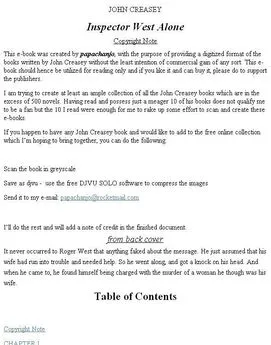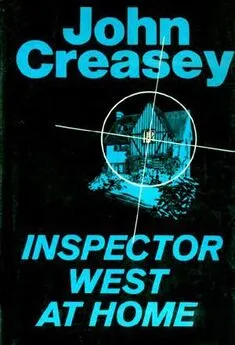John Creasey - Inspector West Alone
- Название:Inspector West Alone
- Автор:
- Жанр:
- Издательство:неизвестно
- Год:неизвестен
- ISBN:нет данных
- Рейтинг:
- Избранное:Добавить в избранное
-
Отзывы:
-
Ваша оценка:
John Creasey - Inspector West Alone краткое содержание
Inspector West Alone - читать онлайн бесплатно полную версию (весь текст целиком)
Интервал:
Закладка:
Nothing happened.
He screamed again. “ No, no, no! ”
Was he losing his reason? Could a sane man lie here and shout like that, in an otherwise empty room, with no one to hear him ?
The light came on.
Marion stood in the doorway, smiling, calm. The light was just above her head, and her face was framed in that wispy auburn. She closed the door gently.
“Did it come again?”
“I—I can’t stand it.” He licked his lips, and wondered whether he appeared frantic enough to be convincing. Apparently he did, because she went to damp the sponge again, came back and bathed his forehead, face, and hands.
She lay down beside him.
“Tell me,” she said.
“It’s—so foul. Foul.” He made his voice break. — “Yes, it must be, but don’t worry—I’m used to hearing all kinds of strange stories. The nightmares will stop when you’ve talked about it.”
He told her the simple truth of what he had seen in Copse Cottage. His voice kept breaking, twice he stopped and turned his head away from her, his body becoming rigid; and each time she rested a hand on his arm and waited, until he went on again hoarsely.
Strangely, he felt easier in his mind.
She put an arm round his shoulders and her face was very close to his.
“Don’t worry,” she said very quietly. “Just go to sleep.”
“What—what time is it?”
“It’s the middle of the night. Don’t worry, just go to sleep. You won’t dream.”
* * * *
He didn’t dream.
* * * *
It was full daylight when he woke, and the sun was shining. He felt more rested and calmer than he had for three days—now nearly four. He lay for a while, looking at the sun shining into a corner of the room, then got up and went to look into the garden. The grass smiled, and the daffodils’ heads were raised; the scene was beautiful and as quiet as his mind. He didn’t ask himself whether he had succeeded in doing what he had set out to do. He knew that he had; and that although he might have to pretend again, this part of the ordeal would soon be over. Marion brought him his breakfast. The man with the white jacket and the mournful face shaved him.
Afterwards, Marion brought in a suit of clothes.
* * * *
Except for a handkerchief, there was nothing at all in the pockets, but Roger felt more himself, fully dressed. The clothes fitted well. He wasn’t allowed a tie, the shirt had a collar attached. He was brought a pair of leather slippers, but not shoes—and therefore no laces.
Marion allowed him twenty minutes to dress, and then came in. She left the door wide open. No one was in the narrow passage behind her. She looked fresh, with nothing to show that she had lost so much sleep during the night.
“Would you like to walk round the garden?”
“Er—may I?”
“Yes, it’s a glorious morning,” she said. “And afterwards you can sit downstairs for a while, a change will do you good. Did you sleep well after I left you?”
“Er—yes.”
“No dreams?”
“No.”
“I told you so,” she said; and she had.
He laughed inwardly, but was haunted by an uneasy feeling; she had prophesied it, and it had happened—her “cure” had worked.
The passage was narrow, with cream walls. There were four doors in it. It led to a landing and a narrow staircase, and he didn’t think that it was the front of the house. Downstairs, in a small hall, Marion took an overcoat from a peg and helped him on with it, slipped a coat over her shoulders like a cloak, and then opened the door. The sun shone brightly on them, warm and spring-like. It was good to breathe fresh air.
A bent old man approached a herbaceous border, but quickly disappeared. The beech-hedge was higher than it had seemed from the window—seven or eight feet high, and it looked thick; it wouldn’t be easy to get through or over that hedge. As they walked, Marion talked idly about trivial things.
At the end of the garden Roger stood and looked at the house.
There was nothing remarkable about it. The walls were grey, most of the windows small—only those on the ground floor appeared to open. Radio music came from one of the rooms. He guessed she didn’t want him to study the house closely, and she pressed his arm gently. He turned— and as he did so, a man appeared at a ground-floor window.
He knew it was the man who had talked to him after the hold-up. Even at this distance, those silvery-steely eyes were unmistakable.
CHAPTER VII
NEWSPAPERS
THE man withdrew, as if anxious not to be seen.
Roger kept his face blank, let his gaze roam past the window towards the daffodils near it. He knew that Marion was looking at him intently, but he wouldn’t meet her eyes. She held his arm lightly and exerted a gentle pressure as they moved on.
“What is the matter?”
“I’m all right.”
“You must learn to tell me exactly what passes through your mind when you’re frightened.”
“I’m not frightened.”
“You are,” she said, and he couldn’t look away from her any longer, had to meet her eyes. They were so clear and grey—restful eyes. “I felt your arm go taut. Unless you talk freely, you won’t get better,” she said. She hadn’t talked so openly before about his being ill. “Why don’t you trust me?”
“You’ve been very good.”
“I want to help, that’s all, and I think I can.”
“How many other patients have you had here?”
“Quite a lot. I’ve been able to help some of them, and I’m very anxious to help you.”
“Why don’t you tell me what’s the matter with me, instead of hinting?”
“Don’t you know what’s the matter?”
“No.” He tightened his lips. “I’m as sane as you are. I want to leave here.”
“You may, as soon as you’re well.”
He pulled his arm free and stalked ahead of her, and she made no attempt to catch him up. The gardener went on working and showed no interest in him, behaving as if this were an everyday affair. He walked across the lawn glancing towards the window where he had seen the man with the fierce silvery eyes, but without staring. He caught a glimpse of the man, standing by the side of the window with a hand at the curtains.
He turned, and saw that Marion was walking slowly across the lawn. The sun shone on her hair, filling it with golden lights, giving her beauty. He waited for her, feeling —and looking—like a sulky schoolboy. She made no reference to what they had been saying.
“I expect you’re tired, you’d better come indoors.”
“I’m all right out here.”
“It’s the first time you’ve been out for several days, you shouldn’t overdo it,” she said. She took his arm again and drew him towards the side entrance to the house. This time there was no doubt; she pressed gently against him. He went into the house, which seemed gloomy after the bright sunlight, and she led the way to a door on the right —overlooking the back garden. Was it the room where the man had been?
It was large, pleasant, sunlit—a drawing-room, furnished with the same taste as his bedroom. In one corner, near the window, was a grand piano, and on it a huge bowl of daffodils and early tulips. Freshness seemed to come from them. There were several sofas and easy-chairs, the carpet was pale green and yellow, on the cream-papered walls were water-colours—good ones. She led him to a chair and waited for him to sit down, pulled up a small table on which was a box of cigarettes and a table lighter. She offered him a cigarette.
“Thanks.”
“Just sit here for a while. I’ll see you again soon.”
She left him with the lighter—the beginning of trust. The door closed softly behind her. He fought back a temptation to jump up and follow her, and as he began to sit down, saw the newspapers.
The sight had a curious physical effect. He stared at them—at this first contact with the real world in four days. The papers were in a rack, near the piano, with several magazines. He went across and picked them up. Before he did so, he thought: “It’s a trick.” They would be old newspapers, of no real interest.
They weren’t; there were four, each a Daily Cry . The first dated March 14, the day he had left the Yard. He looked at the others; March 15, 16, and 17 . He looked at the second, and the headline leapt up at him:
GIRL MURDERED IN LONELY COTTAGE.
The body of an unknown girl, her face savagely mutilated, was found by the police in Copse Cottage, Helsham, one of the loneliest parts of Surrey. The killer had smashed a window in order to force entry, and broken down the door of the girl’s room with an axe.
There was a great deal more, but nothing about Roger or the hold-up. He dropped the paper and picked up the next.
GANG RESCUES KILLER—
POLICEMAN SAVAGELY ATTACKED
There was the whole story; much more than there had been in the first paper. He scanned it swiftly, for names. The man who had been charged was “believed to be Arthur King, with an address at Kingston-on-Thames”; there was nothing about Roger West. He glanced through the rest of the paper quickly, seeking only headlines, and found what he wanted on an inside page—a short paragraph with a small heading: Yard Man Missing.
Chief Inspector Roger “Handsome” West, youngest C.I. at Scotland Yard, left his office late on Monday afternoon, and has not been seen or heard of since. The Yard authorities believe that West, who has been working at high pressure for several months, may be suffering from loss of memory or some other illness.
POLICE HUNT MURDER GANG
There was much more behind that; he could see the wary hand of the Yard, requesting the newspapers to play down the fact that he was missing. There was no photograph, nothing to suggest a hue and cry, nothing to hint that his disappearance might be in any way connected with the murder. He picked up the fourth paper—that morning’s.
Everywhere in Great Britain the police are seeking the gang which rescued a killer from a police guard near Helsham, Surrey, late on Monday night. It is believed that an arrest will shortly be made. The rescue, described fully in yesterday’s Cry, was the most daring in police annals.
The dead girl has not yet been identified. There was nothing at the house where she was found to suggest that she lived there, and the house has been empty for several months, the owner, Mrs. Ethel Malloy, being abroad. The police theory is that the murderer made an appointment with the unknown girl who discovered his evil intentions too late and locked herself in. Her face was so badly mutilated that photographs cannot help with identification.
Sir Harry Gregg, chief pathologist at Scotland Yard, says that the girl was probably in the early twenties, but there were no distinguishing marks on the body. The police are anxious to have details of any young woman who has been missing from her home since Monday last, and who answers the following general description: Height: 5 ft. 6 in.; medium to dark hair; blue eyes; well-developed; Weight: 10 stone 4 lb. At the time of her death, the victim was wearing a pleated black-serge skirt, white-silk blouse with four mother-of-pearl buttons the size of two-shilling pieces, a three-quarter-length coat to match the skirt, nylon stockings size 9½ (French make), black suede shoes, rayon underwear (peach colour). The names of the suppliers and manufacturers of all these articles of clothing had been removed.
* * * *
Roger groped for another cigarette and lit it without thinking of that token of trust—he was left with a lighter. There was plenty to go on; absence of name tags shouldn’t prevent the police from tracing the clothes. The “French make” introduced a difficulty; was it possible that the girl had come from France? No more than an outside possibility.
Читать дальшеИнтервал:
Закладка:










